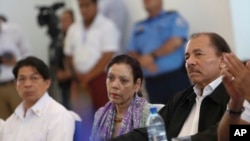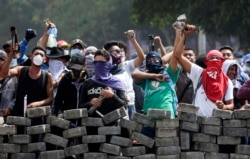The Vatican's diplomatic envoy to Nicaragua said Thursday he has received a letter from President Daniel Ortega's government apparently saying talks with the opposition on resolving the country's more than year-old political standoff are over.
Apostolic Nuncio Waldemar Somertag told The Associated Press that this week's letter said the government's position is that the dialogue "concluded with the definitive absence of the other side."
Somertag declined to share the letter's full contents, but said it was dated July 30 and addressed to the Vatican. He added that his understanding was a similar letter was sent to the Organization of American States. The nuncio and OAS representative Luis Rosadilla had served as witnesses and observers to the February-May negotiations.
Asked if he interpreted the letter from Foreign Minister Denis Moncada as a definitive end to dialogue, Somertag said: "Regrettably, I have that impression. ... I would very much like to be wrong."
There was no immediate comment from Ortega officials on the letter, which was also reported in Nicaraguan media.
The Central American nation's crisis erupted in April 2018 with protests that grew to demand Ortega's exit from office and early elections, with demonstrators accusing him of consolidating power and ruling in an authoritarian manner.
Officials have said the protests were tantamount to an attempted coup and have repeatedly accused government opponents of "terrorism."
Political prisoners
A crackdown on the demonstrations resulted in at least 325 dead, over 2,000 wounded, hundreds imprisoned and tens of thousands fleeing to exile, according to the Inter-American Commission on Human Rights.
The opposition walked away from talks in May to pressure authorities to free about 700 people it considered political prisoners, the last of whom were released June 11.
Jose Pallais, a negotiator for the Civic Alliance opposition group, said the government is trying to project a position of strength when it has not lived up to commitments made at the earlier negotiations.
"The government has still not told the people why it rejects returning to dialogue," Pallais said.
Opposition leaders say 120 people detained for political reasons remain behind bars; the government says those people were not covered under the original agreement and rejects the notion that it holds any political prisoners.
Calls for dialogue
The Civic Alliance has called for a restart of negotiations, and on Wednesday its delegates went to a business center where talks were held previously — but no government representatives showed up.
The private letter appears to have been a response to the Civic Alliance's calls for new talks. Opposition leaders also want the government to restore civil liberties restricted in the wake of the protests, allow election reform and move up elections scheduled for 2021.
Ortega has ruled out leaving office before the end of this term. In a recent political appearance, he said his Sandinista movement was "ready to win" in 2021.
Somertag declined to say whether Pope Francis could intervene, but stressed that dialogue is the "only way" to resolve the stalemate.
"The Holy See backs a peaceful and negotiated resolution to whatever conflict," Somertag said. "The messages of the Holy Father together with the daily actions of his representative in Nicaragua are clear that this kind of resolution is the only viable and necessary one to overcome the sociopolitical crisis in Nicaragua."
Pallais said that now "the possibility for dialogue to be restored depends on efforts by the OAS and its strength against the government. There is no other possibility."
The Inter-American Commission on Human Rights said in a tweeted statement that it regretted the government's position on not continuing talks "in a context of persistent violations" of human rights in Nicaragua.
It said that "persecution of opponents through detentions, threats and harassment" continue and civil liberties continue to be suspended. It also said impartial investigations are needed into the killings.





